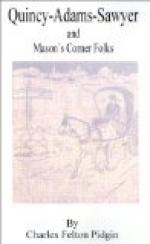“Is there no date?” asked Quincy.
“Oh, yes,” replied Celeste, “March 18, 183—.”
“Thirty years ago,” said Quincy.
Celeste read on:
“Dear brother Silas:—You will, no doubt, be surprised to find I am in this town when I usually go to Gloucester or Boston, but the truth is I had a strange adventure during my last fishing trip on the Polly Sanders, and I thought I would come into port as close to you as I could. About ten days ago I had a good catch on the Banks and sailed for home, bound for Boston. A heavy fog came up, and we lay to for more than twenty-four hours. During the night, heard cries, and my mate, Jim Brown, stuck to it that some ship must have run ashore; and he was right, for when the fog lifted we saw the masts of a three-master sticking out of water, close on shore, and about a mile from where we lay. We up sail and ran down as close as we dared to see if there was anybody living on the wreck. We couldn’t see anybody, but I sent out Jim Brown with a boat to make a thorough search. In about an hour he came back, bringing a half-drowned woman and just the nicest, chubbiest, little black-eyed girl baby that you ever saw in your life. Jim said the woman was lashed to a spar, and when he first saw her, there was a man in the water swimming and trying to push the spar towards the land, but before he reached him the man sunk and he didn’t get another sight of him.”
“Oh, my poor father!” cried Celeste. The letter dropped from her hands and the tears rushed into her eyes.
“Shall I finish reading it?” asked Quincy, picking up the letter.
Celeste nodded, and he read on:
“I gave the woman some brandy and she came to long enough to tell me who she was. She said her name was Linda Chester or Chessman, I couldn’t tell just which. Her husband’s name was Charles, and he was an artist. He had a brother in Boston named Robert, and they were on their way to that city. The wrecked ship was the Canadian Belle, bound from Liverpool to Boston. I didn’t tell her her husband was drowned. I gave her some more brandy and she came to again and said her husband left a lot of pictures in London with Roper & Son, on Ludgate Hill. I asked her where she came from and she said from Heathfield, in Sussex. She said no more and we couldn’t bring her to again. She died in about an hour and we buried her at sea. I noticed that her nightdress had a name stamped on it different from what she gave me, and so I cut it out and send it in this letter. Now, I’ve heard you and Heppy say that if you could find a nice little girl baby that you would adopt her and bring her up. I sold out my cargo at Portland, and so I’ve put in here, and I’ll stay till you and Heppy have time to drive down here and make up your minds whether you’ll take this handsome little baby off my hands. Come right along, quick, for I must be off to the Banks again soon. From your brother,




